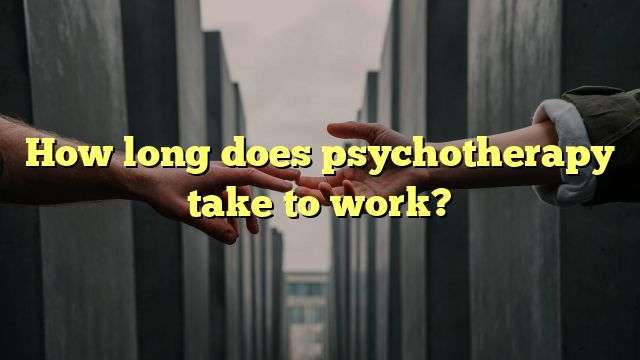Understanding the Length of Psychotherapy
Psychotherapy is a process of treatment that helps individuals manage and overcome their mental health issues. It is an effective and long-term approach to helping individuals cope with their problems, and the length of time that it takes to see results varies from person to person. Understanding how long psychotherapy typically takes to take effect is key to making an informed decision when seeking treatment.
What is Psychotherapy?
Psychotherapy is a form of mental health treatment that helps individuals to identify and address the underlying causes of their mental health issues. It is a collaborative process between a therapist and a patient that focuses on understanding the patient’s thoughts, feelings, and behaviors, and how they interact with one another. Psychotherapy is typically conducted in individual or group settings, and the length of treatment may vary depending on the individual’s needs.
How Long Does Psychotherapy Take to Work?
The length of time it typically takes for psychotherapy to take effect varies from person to person. It is important to keep in mind that everyone responds differently to psychotherapy, and the length of time it takes to see results can depend on several factors, including the individual’s mental health issues, the severity of the issues, the type of psychotherapy being used, the patient’s ability to engage in the process, and the patient’s level of commitment to the process.
Recent research indicates that, on average, 15 to 20 sessions are required for 50 percent of patients to recover as indicated by self-reported symptom measures. However, the length of time it takes for psychotherapy to take effect may be shorter or longer depending on the individual’s unique needs.
Factors That Impact the Length of Psychotherapy
There are several factors that can impact the length of psychotherapy, including:
- The severity of the issue: The more severe the mental health issue, the longer it may take for psychotherapy to take effect.
- The type of psychotherapy used: Different types of psychotherapy can have different lengths of effectiveness. For example, cognitive behavioral therapy (CBT) is typically shorter in duration than other forms of psychotherapy, such as psychodynamic therapy.
- The patient’s level of commitment: The patient’s commitment to the process is an important factor in determining the length of time it takes for psychotherapy to take effect. Patients who are more engaged in the process and willing to work on their issues are more likely to see results in a shorter amount of time.
- The patient’s ability to engage in the process: The patient’s ability to engage in the process is key to the effectiveness of psychotherapy. Patients who are able to communicate openly, honestly, and effectively with their therapist are more likely to experience success with psychotherapy.
The Benefits of Psychotherapy
Psychotherapy can be a beneficial treatment option for individuals who are struggling with mental health issues. It can help individuals to identify and address the underlying causes of their issues, learn new coping skills, and manage their symptoms more effectively. In addition, psychotherapy is a long-term approach that can help individuals to sustain their recovery in the long-term.
Conclusion
The length of time it takes for psychotherapy to take effect can vary from person to person, depending on several factors. Recent research indicates that, on average, 15 to 20 sessions are required for 50 percent of patients to recover as indicated by self-reported symptom measures. However, the length of time it takes for psychotherapy to take effect may be shorter or longer depending on the individual’s unique needs. Psychotherapy is a beneficial treatment option for individuals who are struggling with mental health issues, and it can help individuals to sustain their recovery in the long-term.




